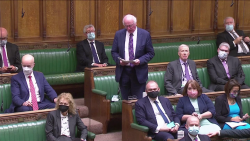Companies in Britain are warning that a new immigration system that prioritizes skilled workers could lead to labor shortages in industries including farming and social care.
The UK government on Wednesday unveiled a system under which potential immigrants to the country will be assigned points based on their specific skills and qualifications, potential salary and profession. Applicants with enough points will be granted a work visa.
Set to take effect in January 2021, the system is designed to reduce the number of unskilled workers coming to Britain and end what the government describes as the country’s “reliance on cheap, low-skilled labor.” Points will be awarded for proficiency in English, and all applicants will be required to have a job offer.
UK Home Secretary Priti Patel said in a statement that the system would allow Britain to attract the “the brightest and the best” from around the world.
Companies that came to rely on EU workers during the decades that the United Kingdom was a member of the bloc were less enthusiastic.
Christina McAnea, assistant general secretary of public sector union UNISON, said there are not enough workers in the country to meet demands for social care, even under the current immigration system. The elderly and vulnerable could be left without support, she said.
“These plans spell absolute disaster for the care sector,” said McAnea.

Farmers have also issued warnings. Minette Batters, president of the National Farmers’ Union, said the sector needs 70,000 seasonal workers in order to have a successful harvest. In years past, many of the jobs were filled by EU workers.
“We have said repeatedly that for farm businesses, it is about having the full range of skills needed — from pickers and packers to meat processors and vets — if we are to continue to deliver high quality, affordable food for the public,” Batters said in a statement.
“Failure to provide an entry route for these jobs will severely impact the farming sector,” she added.
Some aspects of the new system will be welcomed, said Carolyn Fairbairn, director general of the Confederation of British Industry. This includes the abolition of a cap on the number of skilled visas the government can issue and the introduction of a post-study work visa for overseas students.
“Nonetheless, in some sectors, firms will be left wondering how they will recruit the people needed to run their businesses,” Fairbairn said in a statement. “With already low unemployment, firms in care, construction, hospitality, food and drink could be most affected.”
Adam Williams, a partner at London law firm DMH Stallard, said that “many organizations will be understandably concerned.” With the unemployment rate at 3.8%, he said “it is hard to see how the domestic labor work force can bridge the skills gap.”

























